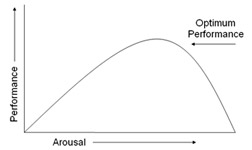
Stress and Anxiety in Teenagers
Young Peoples Unit, NHS Lothian
Cathy Richards Consultant Clinical Psychologist
http://www.stressandanxietyinteenagers.co.uk
Introduction
Stress is our reaction to anything that makes a demand upon us.
It can result from something happening around us or from something within. It can result from life events as diverse as an exam, being bullied or a new relationship.
This resource will consider what causes stress and how to manage it creatively. Everyone reacts to stressful situations differently so as you explore the park think about how the information applies to you and the people around you.
Think about your most recent experience of a stressful situation. Since this can involve almost any demand, pressure or threat that brought about mental or physical tension, an incident will probably come to mind easily.
Take a moment to think about it and note down:
For Example:
Situation - In an exam
Thoughts - "Oh no Iím Going to fail"
Feelings - Panic
Physical reaction - Mind blank, shaking, rapid heart beat
Behaviour - Skimming thruí the paper, not stopping to read any questions properly
Impact on relationships - Thinking that everyone will think Iím stupid and ignoring friends after the exam Ďcos I was sure they would laugh at me'.
Stress can be described as arousal. Itís arousal that gets us up in the morning on time for registration, or makes our heart beat when we see the person we want to date. This arousal can help us to concentrate, write fast and to do well in exams and other stressful situations.
Indeed some people love fast-paced living and many of us are at our most creative when stressed. Some people seem to seek out stressful situations such as high risk sports just for the buzz that they provide. These people tend to see the potential stress in a situation as a challenge rather than as a threat. This means that each new challenge is seen as positive rather than negative.
If we experience too much arousal, however, our ability to do things well is affected. The diagram below illustrates how our performance increases as arousal increases until we reach our optimal point. If arousal increases beyond this point then our effectiveness reduces.

We need to move up and down the curve through out the day, sometimes experiencing high arousal e.g. taking an exam or reading out some work in class and at other times experiencing low arousal (e.g. watching "Friends" or "The Simpsons") . Over a week we also need a balance between really busy days and more mellow ones. If we maintain this balance then it will help us to respond well to stress. Sometimes, however, life seems to throw a whole load of things at us which seem out of our control and are really hard to manage.
Quiz 2 in the maze section of the resource lists some of these events. For example, things like people dying or getting sick or being dumped by a boy/ girlfriend. If we experience lots of these challenging life events within 6 months then we are more likely to get stressed or anxious. Stress builds up and sometimes it may well be a small event which following on from a series of major life events tips the balance and leaves you feeling like you just canít manage anymore.
Take a few moments to read through the park's different areas...
The Winding Woods: this section takes you step by step through common symptoms of stress and anxiety.
Tree of Wisdom: here you can learn about ways to recognise & deal with symptoms of stress and anxiety. You can either help yourself or receive help for a friend.
Park Maze: pick your way around the park's maze, answering questions about the symptoms of stress and anxiety & the kinds of things young people say to themselves when feeling anxious.
Boating Pond: rest your feet at the boating pond and listen to relaxation techniques, which will help you to cope on a daily basis.
Secret Garden: by unlocking the chests in the secret garden you can witness stories from young people who have suffered from the effects of stress and anxiety.
Boaters' Cafe: in the cafe you can learn about resources on the web that provide more advice on dealing with stress.